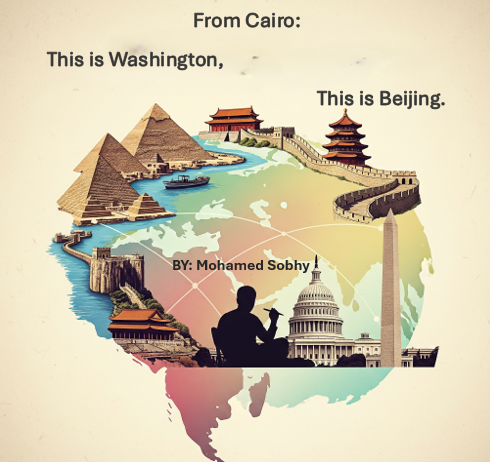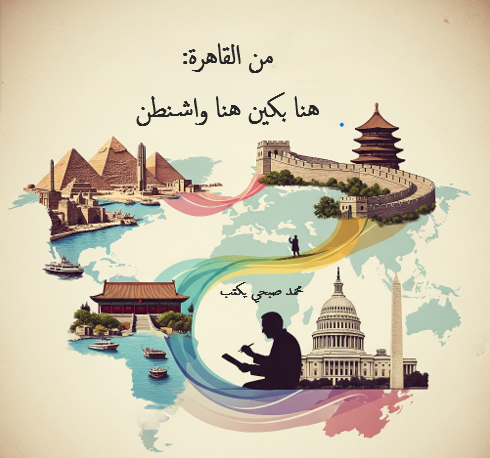When crisis strikes, the first casualty is often truth, swiftly followed by human rights. Authorities instinctively invoke “security,” “stability,” and “resilience” as justification for silencing dissent, dismissing calls for freedom as dangerous luxuries. Any demand for any type of rights or freedoms is met with a canned response: “The time is not right,” “talking about […] اقرأ المزيد
From Cairo… This is Beijing From Cairo… This is Washington By: Mohamed Sobhy Egypt Caught in the Fire of Values and Political Models In a world heading toward open conflict between major powers, with multiple poles declaring the end of the era of a unipolar world. Cairo is no longer merely the capital of a […] اقرأ المزيد
بقلم محمد صبحي في عالمٍ يتجه نحو صراع مفتوح بين القوى الكبرى، وأقطاب متعددة تعلن انتهاء زمن القطب الواحد لم تعد القاهرة مجرّد عاصمة لدولة إقليمية، بل باتت ساحة يتقاطع فيها نفوذ واشنطن وبكين، ويتصارع فيها نموذج الدولة الليبرالية الغربية مع النموذج السلطوي الشرقي. وبين الرغبة في التنمية، والحنين إلى الاستقرار، […] اقرأ المزيد
في لحظات الأزمات، تميل المجتمعات والسلطات إلى تقديم “الأمن”، أو “الاستقرار”، أو “الصمود” كأولوية قصوى، تُبرِّر تأجيل أو قمع أي مطالبة بالحقوق والحريات. يقابل اي مطالب بأي نوع من الحقوق أو الحريات برد معلب جاهز في انتظار السائل “الوقت غير مناسب”، وإن “الحديث عن حقوق الإنسان ترفٌ لا وقت له”، وإن “من يطالب […] اقرأ المزيد
By: Mohamed Sobhy, Lawyer
The Middle East is in constant turmoil. From the ongoing war and genocide in Gaza to the recent “Twelve-Day War” between Israel and Iran, regional priorities have been reshuffled. This begs a critical question for Egypt: How have these tensions impacted its human rights discourse? Are they a cover to sideline human rights demands, or a tool to reshape Egypt’s international image?
Shifting Priorities: From Rights to Security
In Gaza, the humanitarian crisis and popular Arab solidarity are met with Egypt’s narrative of “national alignment” and a “common enemy.” Concurrently, the escalation with Iran shifts focus to security threats. As these crises intensify, human rights have receded from public and political view, replaced by priorities of “national security” and “internal stability.”
This has eased international pressure on Egypt regarding political detainees and restricted freedoms. With the upcoming parliamentary elections, official discourse now emphasizes:
- Stability First: Prioritizing order over civil and political rights.
- The External Enemy: Using Israel and Iran to justify a tightening security grip.
- Egypt’s Leadership Role: Presenting itself as a regional mediator to polish its image, amidst evident Western double standards.
Exploiting Crises: Justification for Repression
The Egyptian state is actively exploiting these crises to justify repression. Key indicators include:
- Silencing Dissent: The state has aggressively shut down critical spaces, citing the need to “not distract the domestic front.” This pretext has enabled the stifling of independent dialogue, and the quiet suspension of the national dialogue platform once cynically used to project an image of openness to the international community.
- Reviving “homeland in danger” rhetoric: This justifies pervasive surveillance and control of digital and media spaces.
- Targeting dissent: Activists, demonstration participants (even those supporting Palestinians), and opposition figures from previous elections face prosecution and harassment. This occurs with clear, perhaps deliberate, international disregard, as major capitals are “preoccupied with wars.”
Foreign Policy Shift: Security Over Reform
Western countries, previously critical of Egypt’s human rights record, now focus on its role in controlling the Gaza border and preventing escalation. Viewing Egypt as a “regional stabilizing factor” against Iranian influence, they’ve eased human rights pressure, fearing the loss of this “pivotal role.” Egypt’s foreign political legitimacy has shifted from being linked to reform to being tied to its security function.
Who Pays the Price?
The cost of this shift is borne by:
Human rights defenders: Facing unprecedented international silence.
Civil society: Suffering from weak support and severe restrictions.
Ordinary citizens: Besieged by fear, their basic rights are overlooked.
Human rights discourse is being redefined as a “Western luxury” unsuitable for current circumstances. While regional concerns are legitimate, Egypt’s political exploitation of the Gaza and Iran tensions has obscured rights and freedoms, creating a more closed environment. The challenge remains for independent voices and civil society to remind all that human rights are not frozen in crises but rather tested by them.






